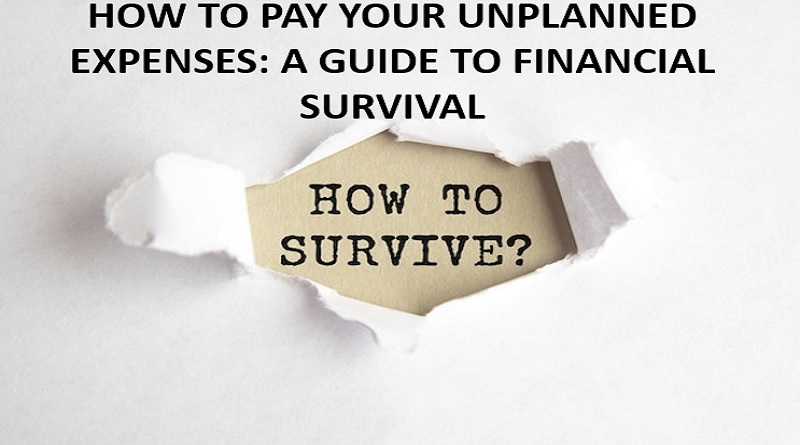HOW TO PAY YOUR UNPLANNED EXPENSES: A GUIDE TO FINANCIAL SURVIVAL
No one ever plans on having an unplanned expense, but they always seem to crop up when we least expect them. Whether it’s a car repair, a medical bill, or a home repair, these expenses can be costly and difficult to pay for.
Here are a few tips on how to pay for your unplanned expenses:
Good 7 Ideas:
- Sell some of your unwanted belongings: We all have things lying around our house that we don’t use or need. Selling these items can help you raise some extra cash to cover your unplanned expenses.
- Get a part-time job: If you have some extra time, getting a part-time job can help you cover your unplanned expenses.
- Ask for financial help from family or friends: If you’re struggling to pay for an unplanned expense, ask your family or friends for financial help. They may be able to lend you the money you need.
- Create a budget: Creating a budget can help you better understand your finances and where you can cut back to free up some extra cash.
- Look for discounts and coupons: When you’re buying items to cover your unplanned expenses, look for discounts and coupons to help save money.
- Apply for a personal loan: If you’re struggling to pay for an unplanned expense, you may be able to apply for a personal loan.
- Use your credit card: If you have a credit card, you may be able to use it to cover your unplanned expenses. Just be sure to pay off your balance as soon as possible to avoid interest charges.
The best tip is to always be prepared for the unexpected by having an emergency fund. This way, when an unplanned expense does crop up, you’ll have the money you need to cover it without having to worry about how you’re going to pay for it.
Bad 7 Ideas:
- Borrowing money from a high-interest lender: Borrowing money from a high-interest lender, such as a payday lender, will only make your financial situation worse.
- Skip paying your other bills: If you’re struggling to pay for an unplanned expense, don’t skip paying your other bills. This will only damage your credit score and make it harder to pay off your debt.
- Charge your expenses to a credit card: If you’re struggling to pay for an unplanned expense, don’t charge it to a credit card. This will only add to your debt and make it harder to pay off.
- Take out a title loan: Taking out a title loan is a bad idea as it puts your car at risk of being repossessed.
- Get a payday loan: Getting a payday loan is a bad idea as it can lead to a cycle of debt
- Dip into your retirement savings: If you’re struggling to pay for an unplanned expense, don’t dip into your retirement savings. This should be a last resort as it can set you back financially in the long run.
- Declare bankruptcy: Declaring bankruptcy should be a last resort as it will damage your credit score and make it difficult to get loans in the future.
The worst tip is to try to cover your unplanned expenses with debt. This will only make your financial situation worse and can lead to a cycle of debt. If you’re struggling to pay for an unplanned expense, look into some of the other options on this list before resorting to debt.
Why do unplanned expenses happen?
There are several reasons why unplanned expenses happen.
Sometimes, they’re due to an unexpected event, such as a car accident or a medical emergency. Other times, they’re the result of poor planning on our part.
For example, we may not have saved enough money to cover a major home repair. Whatever the reason, unplanned expenses can be difficult to pay for.
How do people usually struggle with that?
According to a survey by the National Foundation for Credit Counseling, 38% of Americans say they wouldn’t be able to cover a $400 emergency expense with cash or savings. This means that nearly four in ten Americans would have to resort to borrowing money if they faced an unexpected expense.
It’s the problem of too little savings and too much debt that often leads to financial difficulty. If you’re struggling to pay for an unplanned expense, it’s important to take a look at your overall financial situation and plan to get out of debt and start saving.








